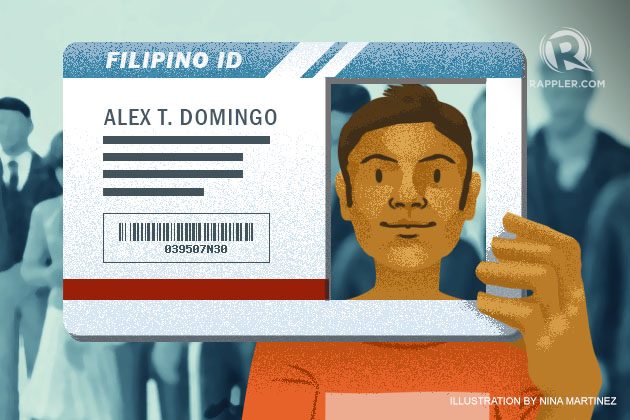SUMMARY
This is AI generated summarization, which may have errors. For context, always refer to the full article.

MANILA, Philippines – At least 3 lawmakers are re-introducing bills seeking to establish a national identification (ID) system for all Filipinos here and abroad.
Outgoing House Speaker and Quezon City 4th District Representative Feliciano Belmonte Jr authored House Bill (HB) Number 12 or the Filipino Identification System Act. AKO Bicol Representatives Rodel Bacobe and Christopher Co also co-authored a bill with the same title, HB Number 523.
Bills creating a national ID system were filed in the previous 16th Congress. The House of Representatives passed them but they were stuck at the Senate until the end of the session.
The Philippines is one of only 9 countries in the world without a national identification system, according to Belmonte. Under his proposal, the Filipino Identification System will consolidate all government-issued ID systems into one to “improve government services and limit red tape in government transactions.”
“The national identification card will lower costs, streamline transactions, and provide ease and convenience,” Belmonte said.
Both bills would require all Filipinos residing anywhere in the world to register their personal information into the central system to be managed by the Philippine Statistics Authority (PSA).
A registered Filipino will be issued a non-transferable Filipino ID card with a number that shall be valid for life.
Filipinos residing or working overseas are to register for their IDs at the nearest Philippine Embassy or consular office in the country where they are staying.
Based on the two House bills, the Filipino ID card would be honored in transactions concerning a person’s identity, marital status, birth, and other personal circumstances.
The ID may also be used for applications for passport, driver’s license, Social Security System (SSS), Government Service Insurance System (GSIS), PhilHealth, Home Development Mutual Fund (Pag-IBIG), and the National Bureau of Investigation (NBI).
The Filipino ID card may also be used to identify voters, schools, and employees, as well as to avail of senior citizens’ benefits. It may also be used for court, prosecutor, and police clearances, and in banking and financial institutions.
Batocabe and Co said the current Unified Multi-purpose ID card for GSIS, SSS, PhilHealth, and Pag-IBIG members serves as an “excellent” case study for their proposed Filipino ID card.
“Once enacted into law, all citizens, not only government employees and SSS members but the self-employed, the unemployed, minors, and Filipinos working abroad will be under the coverage of the National ID system,” Batocabe added.
If passed into law, the Filipino Identification System Act would make the following offenses punishable:
- Falsifying information in applying for the issuance of a Filipino ID card or procures through fraud
- Utilizing the card in an unlawful manner
- Any person or establishment refusing to recognize the Filipino ID card of a member
- Any public official or employee conniving in the application or issuance of an unauthorized Filipino ID card
Violators shall be punished with a fine of not less than P50,000 but not more P500,000, or an imprisonment of not less than 6 months but not more than two years or both.
Government officials and employees who commit these offenses will be perpetually disqualified from government. – Rappler.com
Add a comment
How does this make you feel?
There are no comments yet. Add your comment to start the conversation.